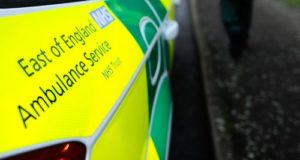By Eric King-
An 81-year-old woman died in her house after waiting almost four hours for an ambulance.
The pensioner, who resided in Clacton, Essex, initially called 999 on Tuesday complaining of chest pains, according to the GMB union. East of England (EEAST) ambulance service said a crew arrived three hours and 45 minutes after the initial call.
GMB regional officer, Dave Powell said the crew had to force their way into the property on arrival because the control room could not contact the woman by phone, and found her dead.
“They’re devastated because they’re not in the job to find people dead, they’re on the job to help people and keep them alive,” said Powell.
“It puts enormous strain and stress on people who are working really hard as it is.
“Three hours and 45 minutes are totally unacceptable for an elderly woman on her own with chest pains.
“Something has got to be done and the government has got to wake up to this crisis.”
He said such cases were likely to be more widespread than the public was aware of. Sandy Brown, the deputy chief executive at EEAST, said: “Our sincere condolences and apologies go out to the patient’s family and friends and we are truly sorry for the ambulance wait that occurred at this incident.
“We have very publicly expressed how stretched the ambulance service is and the pressures our staff and the NHS as a whole have been under the past few days. As a trust, we have experienced our busiest days ever and we know our partners in the hospitals are in the same situation.
“A clinician in one of our control rooms made a welfare call and spoke to the patient at 9.47pm and an ambulance crew arrived at the address at 11.46pm. The patient was found unconscious and not breathing and sadly died at the scene.
“This incident is being investigated by the trust and we will report back our findings in due course.”
Ambulance services are falling behind schedule and letting patients down in a big way. The very stormy winter weather has not helped matters, and the death of an old lady is a disastrous consequence of inadequate services. The ambulance services have been so poor lately and that it has used taxis to transport patients to the hospital.
CONDOLENCES
Sandy Brown, the deputy chief executive at EEAST, said: “Our sincere condolences and apologies go out to the patient’s family and friends and we are truly sorry for the ambulance wait that occurred at this incident.
“We have very publicly expressed how stretched the ambulance service is and the pressures our staff and the NHS as a whole have been under the past few days. As a trust, we have experienced our busiest days ever and we know our partners in the hospitals are in the same situation.
“A clinician in one of our control rooms made a welfare call and spoke to the patient at 9.47pm and an ambulance crew arrived at the address at 11.46pm. The patient was found unconscious and not breathing and sadly died at the scene.
“This incident is being investigated by the trust and we will report back our
The service has received 4,200 calls on Tuesday, compared with a daily average of about 3,000. Hospitals shortages have also been very disruptive in the middle of a terrible witness crisis for the NHS.
“I’ve been making clear that the state that the system is in, it’s inevitable that people will lose their lives and failures of care will mean people will be left with long-term disabilities,” he said.
“One of the major strains is the ambulance service and its link with A&E, problems with handovers and ambulances stacking up, which leads to delays. Paramedics are having to work long shifts because of the insufficient workforce. These are the human consequences of the financial state the NHS is in. This is why it’s vital the government acts, the prime minister can’t stand by and allow the NHS to deteriorate.”




